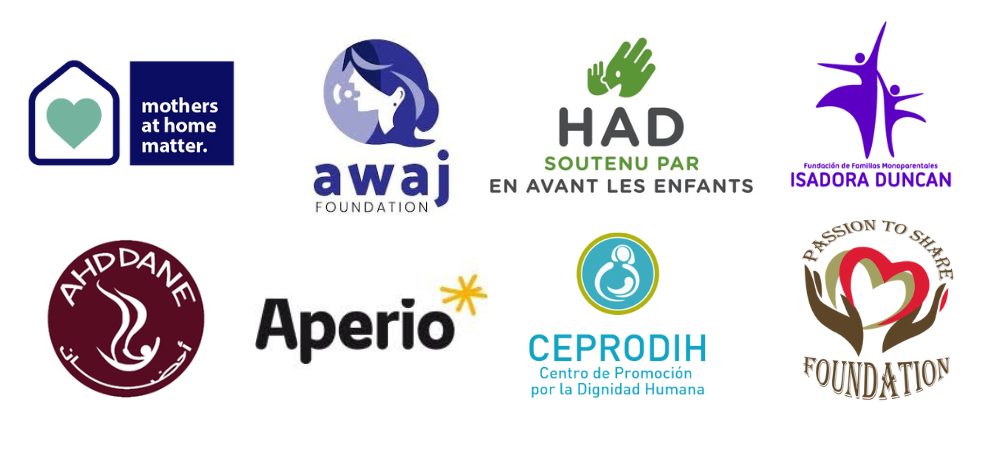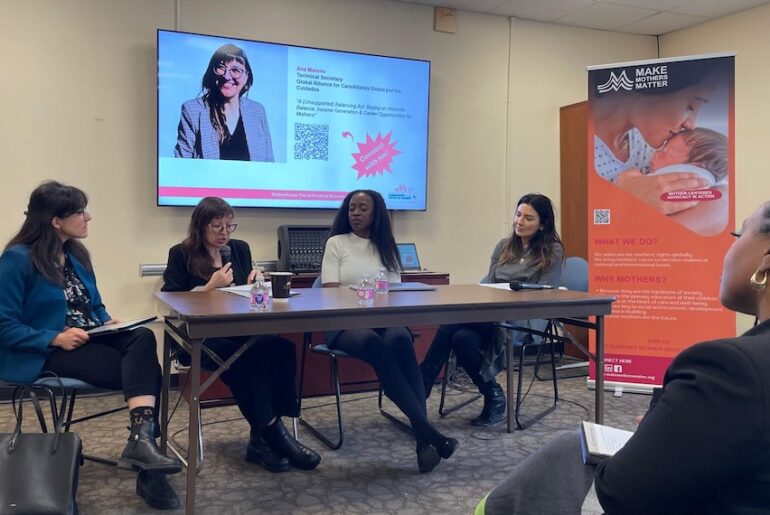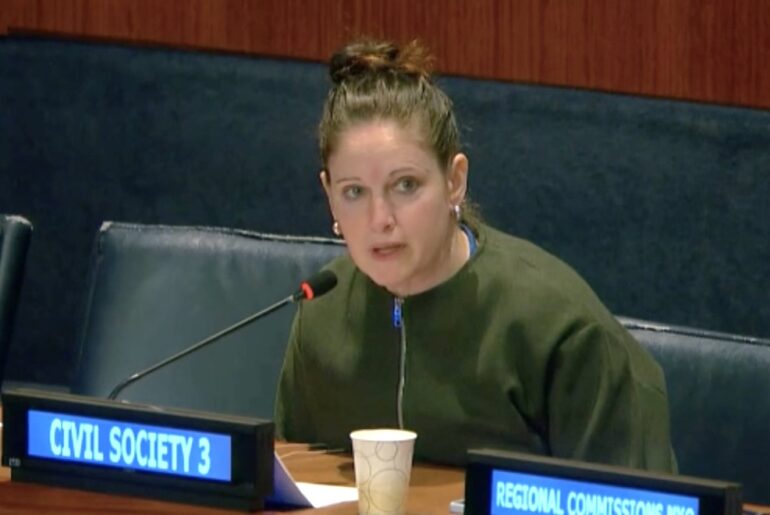Leave no single mother Behind: solutions from across the world
05.02.23
UN New York, CSocD61 - The virtual event we are organizing as part of the 2023 UN Commission on Social Development will draw attention to the specificity of the situation of single parents, in particular single mothers, their vulnerability to poverty and the challenges they face to access decent work. Our event will also draw upon the experiences of grassroots organizations to put forward solutions and to call on governments to act. Read more below and join us.
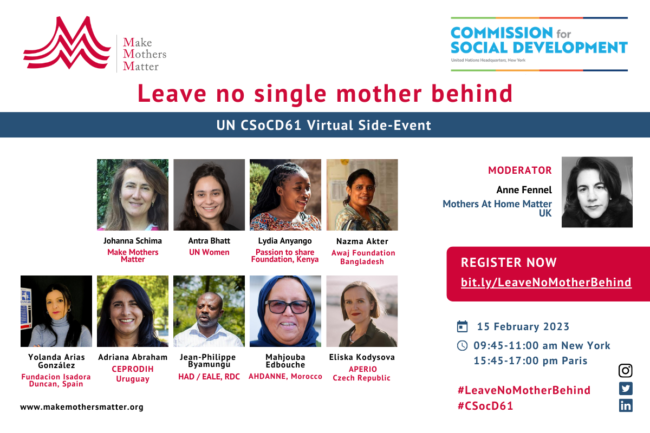
Wednesday 15 February 2023
9:45-11:00 New York / 15:45-17:00 Paris
→ Register here
Program
Moderator:
- Anne Fennell, Chair, Mothers At Home Matter (MAHM)
Panel:
Setting the scene:
- Antra Bhatt, Statistics specialist, Research and Data Section, UN Women – The statistics and realities of single mothers: making them visible to policy makers
Solutions from the ground:
Several successful actions of grassroots organisation across the world from MMM’s Network and beyond, will be presented, either via live presentations or short videos.
- Nazma Akter, Founder, Awaj Foundation, Bangladesh – Services (e.g. childcare) and advocacy for mothers in the garments industry (video message)
- Eliska Kodysova, CEO, Aperio, Czech Republic – Single but strong: a program to empower single parents
- Mahjouba Edbouche, Founder & president, Ahddane, Morocco – Support for single mothers through councelling, childcare and women’s shelter (video message)
- Lydia Anyengo, Founder and Executive Director of Passion to Share Foundation and Kokomelon Daycare/Nursery School, Kenya – Empowering mothers in the slum of Kibera slum through training and childcare services
- Adriana Abraham, Founder and Director, CEPRODIH, Uruguay – Training programs for socio-economic inclusion of mothers in vulnerable situations (video message)
- Yolanda Arias González, Director of human resources and researcher at the State Observatory for Single-Parent Families, Isadora Duncan, Spain – Advocacy and support for single parents in vulnerable situations (e.g. training in personal finance and saving possibilities, legal and administrative support)
- Jean-Philippe Byamungu, Director, HAD/En Avant les Enfants, DRC – Empowering young single mothers in the agricultural sector and making them count in the community (video message)
Solutions from governments
- Johanna Schima, head of EU delegation, Make Mothers Matter – Examples of good practices from the governments of the European Union: the EU Child Guarantee as a first step in the right direction + MMM recommendations to EU countries
French interpretation will be provided.
→ Register here
Background information
Make Mothers Matter has long highlighted the inequitable distribution of unpaid family care work and how it prevents women, in particular when they are mothers, to access decent work and fully participate in the labour market, an issue which came under the spotlight during the Covid-19 crisis.
The situation is exacerbated for parents who raise their children alone, most of them mothers. Indeed, a single mother does not have much choice: she must assume full responsibility for both the unpaid work of running the house and raising children, and the necessary paid work to bring an income into the home.
Globally nearly 8% of all households are headed by a single parent, with 84% of them mothers. This represents 101.3 million single mothers, i.e. mothers living alone with their children – and these numbers are rising. However, an important diversity exists in their living arrangements: many do not live alone with their children but instead live in extended households, meaning that they are not counted – and mostly invisible to policy makers.
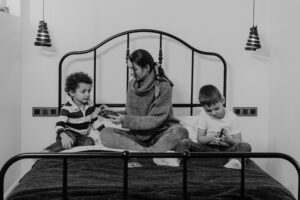
Between the challenge of juggling the unpaid work of raising children alone, the barriers they face in accessing decent work, and the exclusion and stigmatization from society, single mothers and their children are all too often over-represented among the poorest, with particularly dire consequences for the future of those children. In every country for which statistics exist and are comparable, i.e. mostly high and upper middle-income countries, single-mother households with young children have higher rates of poverty when compared to dual-parent households with young children.
Still, many grassroots organisations – in both developed and developing countries – have realized the magnitude of the problem and the importance of supporting and empowering single mothers and their children. Solutions and good practices exist, which may be transposed to other places and scaled-up. What’s more, these actions demonstrate that when single mothers receive adequate support, they represent an important economic force for development, both of their children and their community.
Governments have been slower to react, but some important steps have been taken, in particular in the European Union.
Our objectives
- Draw attention to the many and diverse challenges faced by single mothers, their over-representation in poverty statistics, and the necessity to support them to lift them and their children out of poverty, so that they are not left behind, a key element to the realization of the 2030 agenda
- Share solutions implemented by grassroots associations, supporting single mothers economically and socially on their way to become financially independent and respected in their community. To inspire other associations and governments to support, replicate and scale-up such actions
- Call governments to action: to develop and implement social policies which target single mothers and their children, while taking into account the specificities of their situation
→ Register here
About the UN Commission on Social Development
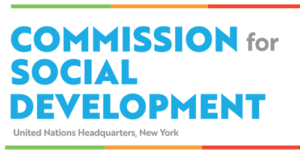 The 61st session of the UN Commission on Social Development (CSocD61) takes place 6-15 February 2023 in New York – this year’s priority theme: ‘Creating full and productive employment and decent work for all as a way of overcoming inequalities to accelerate the recovery from the COVID-19 pandemic and the full implementation of the 2030 Agenda for Sustainable Development’.
The 61st session of the UN Commission on Social Development (CSocD61) takes place 6-15 February 2023 in New York – this year’s priority theme: ‘Creating full and productive employment and decent work for all as a way of overcoming inequalities to accelerate the recovery from the COVID-19 pandemic and the full implementation of the 2030 Agenda for Sustainable Development’.
See also:
- The UN Commission on Social Development website and its 61st Session
- Our written statement to the 61st Commission – Mothers and decent work
- Our 2020 CSocD side-event on Single mothers’ vulnerability to homelessness
- Our contribution to the European Union Child Guarantee, an important step to prevent child poverty and thus support single-parents in the EU
Time Poverty and the Motherhood Penalty
Unveiling Economic and Social Injustices
09.07.24
Mothers play an essential role in families by ensuring their loved ones are nourished, educated, and healthy, but their unpaid care work often leads to economic and social injustices, known
Envisioning care as a common thread to global crises
29.07.24
UN New York - Our virtual HLPF side-event brought together experts to shed light on how the various global crises we face (in particular climate change and other environmental crises,
We call for multi-stakeholder approach to recognise and support unpaid care work
21.07.24
UN New York - Participating in the meeting of the UN Economic and Social Council (ECOSOC) on care and support systems, MMM reaffirmed the principle of co-responsibility, which should underpin
